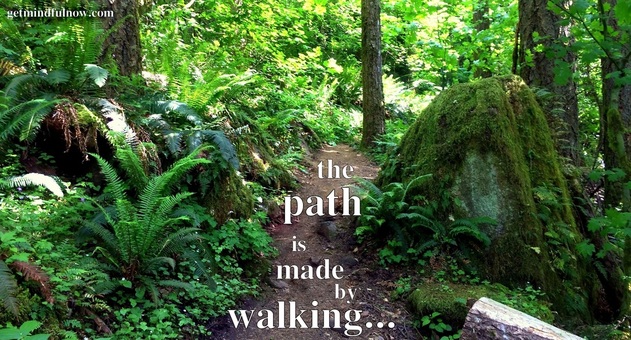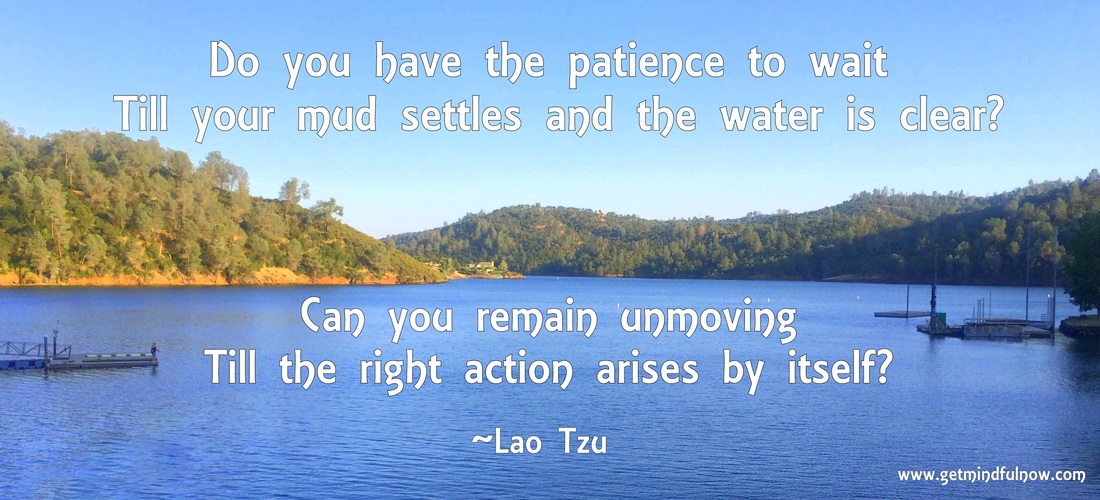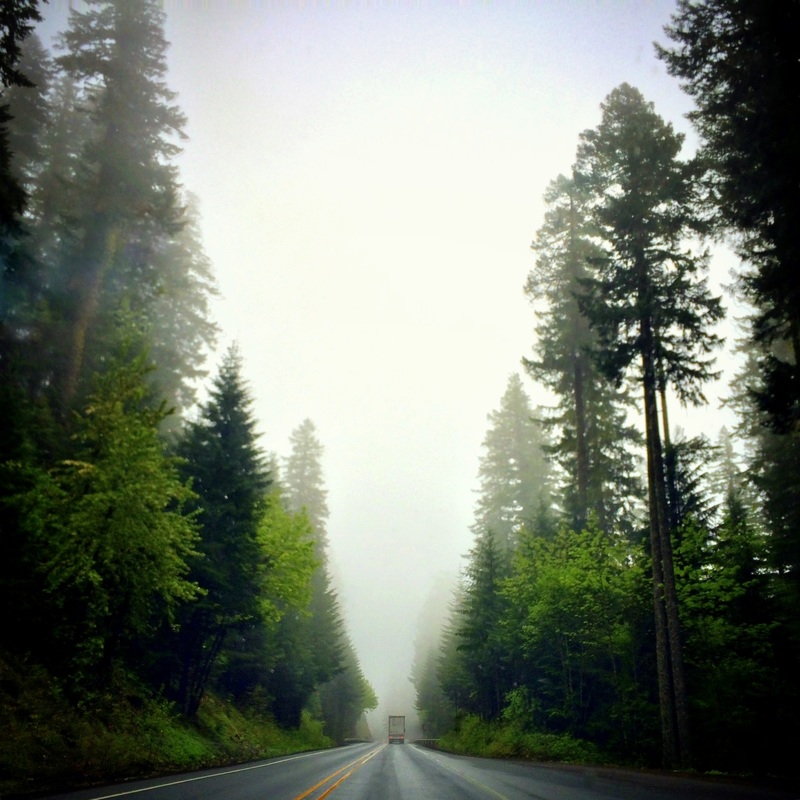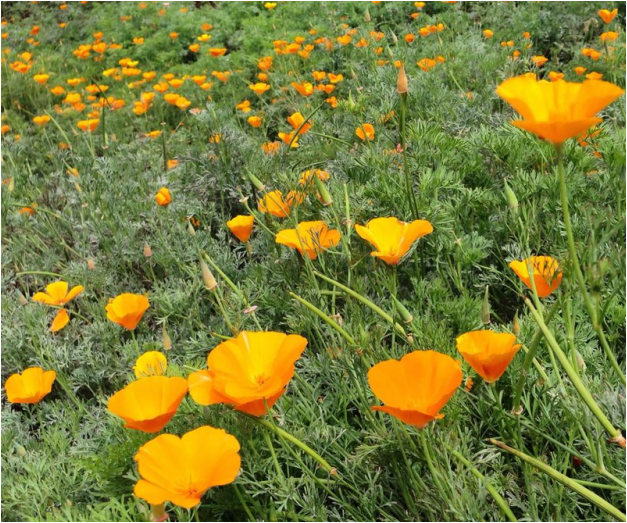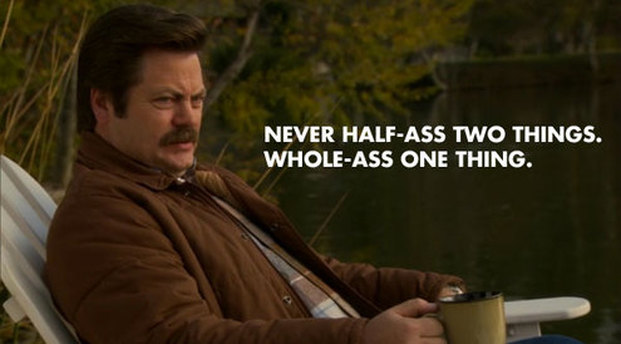|
The path is made by walking. Anyone with the smallest of fingers on the mindfulness pulse has heard some version of that statement before. It's ubiquitous, and for good reason – mindfulness is about living in the present rather than focusing on the path ahead or behind us. But like most sayings, ideas, and other poignant things, hearing is only one level of understanding. In order to truly get it, something has to happen in one's life to make it finally click. I've already written a lot on this topic. I thought I was using it in my daily life. I thought I really got it, until I realized there is actually nothing to get. When I set off on my 3-week, 8-state, 4,000-mile, solo-camping, journeyman trip, the "path is made by walking" was a launching off point. The past was behind me and the future yet unknown, so I would walk forward on a path – a literal path in the form of trails across 13 national parks and forests and an intellectual path that would hopefully mark my next steps in life. Some part of me expected the trip to uncover all the answers in my life like some sort of hallucinatory, native american vision quest. I wasn’t alone in that expectation – when I returned, numerous friends wanted to know what I'd discovered about life and if I’d figured out what I wanted to do next with mine. But sadly, I didn't return with all the answers. I certainly came back with a number of important lessons from the journey - confidence, humility, escaping nostalgia, the folly of multitasking, the true meaning of consequences, a renewed passion for the environment, and the freedom of disconnecting from the digital world - but no one lesson told me exactly what to do with myself now that I was home. The lessons I learned were more like suggestions – they gave me an idea of how to move along the path but no real indication of which direction to travel. So when I first got home, I struggled. I searched in vain for that one big vision from my vision quest, but I had no more clarity on how to move forward than I did before the trip, and I was left confused and crestfallen. Then, after two weeks back home, and feeling as though I was blindly crawling down my path instead of confidently striding forward, I finally got around to finishing the amazingly poignant "Wild" by Cheryl Strad. The closing passage: "It was all unknown to me then, as I sat on that white bench on the day I finished my hike. Everything except the fact that I didn't have to know. That it was enough to trust that what I'd done was true. To understand its meaning without yet being able to say precisely what it was... to believe that I didn't need to reach with my bare hands anymore. To know that seeing the fish beneath the surface of the water was enough. That it was everything. It was my life – like all lives, mysterious and irrevocable and sacred. So very close, so very present, so very belonging to me. How wild it was, to let it be." It was the answer I had been looking for... and the answer was that there is no answer.
You don't go out into the woods, close your eyes, and see the whole path laid out in front of you. You go out into the woods, close your eyes, and you hear the wind whispering through the pine trees, you feel the mist from a 600 foot waterfall brush against your face, you smell a perfume of ferns and soil and wild flowers. You go out into the woods, close your eyes, and you don’t see a vision...you see the powerful simplicity of right now. That is why the path is made by walking. Each step you take is this very moment. Each step is all that you can control, all that you know, all that you do. And with each step your path grows. It doesn't necessarily show you what's ahead, but by making each step count in the present you build up the path of your future. Your current step is reading this blog post. Your next step, what you do with your next moment, is up to you. My current step is sharing these blog posts with all of you. My next step, what I do with my next moment, is up to me. But no matter what, I’m going to charge forward with confidence and joy to see where it takes me. It was all unknown to me then, as I sat in my Prius on the day I finished my journey. Everything except the fact that I didn't have to know. Instant reaction...
Why do we feel the need to post about every story, jump on every bandwagon, opine on every creation, and respond to every comment? Life doesn't happen in an instant, it develops slowly over time. Whatever your reaction now, it will undoubtedly change later. But instead of giving yourself the space to dwell on your thoughts, to give them real consideration, we quickly post it, permanently attaching it to our public persona. As if that instant and unnuanced reaction is somehow fixed. Instant gratification... Why do we expect to see an instant reaction every time we post a story, jump on a bandwagon, opine on a creation, or respond to a comment? Life doesn't happen in an instant, it develops slowly over time. Whatever people's immediate response may be, it will change. But instead of giving them the space to thoughtfully react to our screed, we wait impatiently for a like or a share. We let ourselves feel deflated when the response is quiet. We backtrack on something we found important and delete a post, simply because not enough people decided to give you an instant pat on the back. Ideas are a tortoise, not a hare. I call for patience. Next time you have an immediate gut reaction, think on it for 30 minutes instead of immediately saying it. Notice how your feelings change over time. Notice how that instant reaction feels extreme after the patience of time softens the sharp edges. Next time your saying something, wait on reaction without expectation. Notice how your confidence grows over time. Notice how that instant gratification becomes less important after the patience of time strengthens your self-worth. There Are No Consequences
6/17/2015
There are no consequences.
Alright, I know that's a bold thing to say, but bear with me for a minute. A consequence is the negative repercussion of a mistake. Dictionary.com calls it an "end-result." That's basic. I get it. But life itself is always changing. What seems like a negative consequence to a bad decision right now, could end up being a positive conquest in the future. Why? Because there is no "end" result, it's all about the path. When you make a mistake and fail, that failure doesn't fall into a void, you learn a lesson and gain experience. While the failure might be difficult, it still teaches you something about yourself. It teaches you how to do better next time. What you call a consequence, I call school. Now of course, there are real consequences out there for the truly stupid and cruel decisions, like jumping off a cliff or committing murder (for some obvious examples). But I'm talking about the everyday decisions we make that turn out to be wrong - the miscalculation or spur of the moment choice that once in a while leads to true ramifications, but mostly just gives us an excuse to fabricate internal strife and regret. Trial and error is the process by which we learn. If our goal in life is to grow, to become a better friend, a better photographer, a better musician, a better businessman, a better parent, a better partner, or really just a better person, then consequences are how we learn to grow up. So I'm calling it out...there are no consequences. There are just ups and downs, arguments and adulations, accidents and achievements, examples and advancements. Consequence as we know is the path to success, as long as you choose to use it that way. The Freedom of Disconnection
6/11/2015
This article is cross-posted with Elephant Journal: www.elephantjournal.com/2015/09/the-freedom-of-disconnection Damn it felt good to be disconnected.
The connection addiction is endemic in our society. It’s one thing to catch up with friends, share a piece of your life, make plans, and discuss things you find important - that’s all well and good. But the ability to do those things at any hour of the day, and the expectation that everyone you know should be available to do so as well, it's just unhealthy. Social media is the drug and smartphones are the enabler. Together they give us a false sense of community, making us believe everyone is waiting with bated breath for our next update or text, when in fact everyone is just going about their own lives. And on the other side of the screen, our devices sit on our laps and in our pockets distracting us with deliciously tempting notifications, making us believe we should be waiting with bated breath for all your updates. One of the main reasons I took off into the woods for three weeks was to put all my mindfulness overtures about turning off notifications and reducing distractions into practice. But it's 2015, so I expected I would have some basic level of phone service available to me for most of the trip. I knew I could stop at Starbucks or McDonald's to use WiFi. If nothing else, I hoped I'd at least have a smidgen of phone coverage for texts and calls in an emergency. Out on the road I quickly realized that I'd seriously overestimated the strength of my network. Dead zones were vast and numerous. I drove for hours on small highways with no coverage whatsoever. Many campgrounds would show a few bars, but when push-came-to-upload, nothing would work. A few campgrounds had no service at all, forcing me to make a call in a real live phone booth so at least someone knew I was alive. When you spend most of your time in cities, it's not something you're used to. If you believe the Verizon commercials, it's not something you'd expect. At first it was frightening. My phone is an extension of me. It’s how I communicate with my friends and family. How I map my route and stream my music. It's how I write and update this blog. I’m so used to it always being there for me, whether I’m bored or in an emergency. In a way, spending hours or sometimes days without phone service felt like I'd lost an arm. Despite all my pronouncements to the contrary, connectivity had become that important to me. To some degree, connectivity is important to all of us. It’s unavoidable in our modern society. But as time rolled on I accepted my new reality. As Cheryl Strayed said in Wild, “This is what I came for, this is what I got.” So I got used to it. A constant connection became the exception rather than the rule. When it was available, it became a treat. By the end of the journey, I loved it. I actually preferred it. At my last destination I had three straight days of no phone service. I felt free, clear, calm, unrestricted, undisturbed, undistracted. I felt present. I don't believe I’m a selfish person, but gleefully reveling in the fact that you all couldn't get in touch with me almost felt egotistical. I knew I was missing out on all your updates and the important news of the day. It’s not as though I lost all interest in sharing things with you either. But I realized that being disconnected for a few days or weeks wasn't the end of the world. I would eventually be back on Facebook to catch up on life. Or better yet, I would eventually see you all in-person so you could fill me in on everything. Rather than being the end of the world, disconnection was the beginning of a new world. One where FOMO was replaced by YOLO, distraction was replaced by presence, and anxiety still existed but it was related to the threat of bears rather than the stresses of multitasking. There were times in the waning days of my trip when my phone did start working...notification bubbles popped up, my pocket buzzed, and a wave of texts crashed in. But at that point I had broken the addiction. The temptation was gone and rather than check those notifications I switched my phone into airplane mode. It was my time to disconnect. It was my time to enjoy the break. It was my time. I’m back in LA now where phones always work, pretty much everywhere. I've caught up with friends and even caught up a little with Facebook (though after being away from it for so long I’m finding it mildly tedious). But truth be told, I miss the freedom of disconnection I found in my journey. I miss the mindfulness it practically forces upon you. I miss what it feels like to realize that you and you alone are in charge or your own entertainment, there is no depending on others or apps. This may change as the days and weeks pass here in the real world. I’ll fall back into old habits, because that’s what people do. But I’m going to do my best to hold on to as much of this lesson as possible. Phones always work here, except when you hike a little further out in the mountains. Phones always work, except when you switch it to airplane mode as a choice, just to take a break. Phones always work except when you choose to be present and ignore the temptation to post every detail of your life on Facebook. We are only as connected as we choose to be. When you have the opportunity, choose real life over digital life. Spring Forward
6/3/2015
"Spring is nature's way of saying, 'Let's party!'" ~Robin Williams As a Southern Californian, the season of spring isn't something for which I'm intensely familiar.
It's not that California doesn't have seasons, it certainly does. Cooler, rainy winters give way to warmer, wildflower-filled springs. But the degree to which you really feel the seasons are not as pronounced as they are in other areas of the world. On my journey I got a chance to really feel it. I encountered both freezing snow and blazing sun and watched as the landscape came to life in the transition. Snowy mountain peaks gave way to bright green hillsides and baby buffalo. Frosty nights made room for pudgy waterfalls and wildflower meadows. The desolation of winter melts away and life springs forward, literally. It’s a natural manifestation of the restart button. All that was old and dead and cold and depressing is full of life and light again. New life grows from the earth, and if we allow it, new life can grow in our heart as well. Of course us humans can grow, renew, and make big life changes any time we want. We just have to decide to make it so. But the season of spring provides us with an example of how to do it. Watching the natural world grow can inspire us to grow in return. As nature sweeps out the old and the cold to make way for life, it can trigger a change in each of our spirits, bring in a sense of renewal and drive. Watching all the beauty that nature brings each spring can remind us of what we could be doing and changing. Or what we should be doing and changing. So let’s use that trigger. Draw on the power of nature and the power of spring to renew yourself. New growth, new life, new you. It's time to spring forward. I never spilled my water while I was on my journey.
Camping, especially camping alone, gives you a different perspective. Regular world comforts provide us a cushy freedom to make mistakes - an oversize pillow to land on when we fall. But when you're in the woods there is no cushion - you land with a thud. This new reality causes a shift - it creates focus. When it came to water, every wasted drop meant more effort to collect it again later. Every wasted drop meant I might run out of water somewhere down the line. So I focused on collecting my water efficiently. I only focused on collecting that water and nothing else, because nothing else actually mattered. Thinking about other tasks was a distraction, and distractions can lead to mistakes. Now I’m home and I immediately fall back into old patterns. At the water dispenser I fill my cup so high that it splashes out. I do this routinely. I don't focus, I multitask, I'm thinking down the line. Multitasking is trendy, but dare I say multitasking is wasteful. Instead of putting all your effort into one important task you spread it out over many. Instead of doing one thing well, you half-ass a bunch of things. My to-do list perpetuates the distraction, making me think I have multiple things to get done so I should work on as many things as possible. But they don’t help me get more done. My mind is spread out and unfocused. My effort is diluted. The lesson of the forest is to be present in your current state. The lesson is mindfulness. I choose to heed the call. I choose to fill, not spill, my water. I choose to engage the task at hand - successfully complete it or fail and learn from it - and only then do I move on. I will make mistakes - I’ll overfill my water from time to time because that’s my habit. But now every time I do that it will serve as a reminder. Each drop of water that falls to the ground is a tap on the shoulder telling me to be present. Mindfulness isn't merely about observing your feelings and leaving it at that, mindfulness is how we choose to engage the world through our everyday actions. Next time you fill up your water cup, next time you're doing anything really, remember to be present. In every task there is mindfulness. |
Access Octomono Masonry Settings
blog searchauthorMy name is Jason Wise. Life's all about the journey, man. Find me on Instagram and Facebook. archives
May 2020
categories
All
subscribe |
